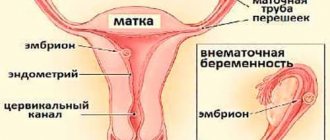How to get rid of early pregnancy
Unfortunately, millions of women around the world decide to terminate their pregnancies early every year.
And this trend is constantly growing. Our country ranks first in the number of abortions. However, the current situation could not contribute to the emergence of easy and harmless ways to get rid of pregnancy. Early pregnancy termination methods
Early abortion is, so to speak, the lesser of two evils. The risk of complications is minimized. Of course, abortion affects the female body: the endocrine, nervous and, of course, immune systems suffer. Therefore, the question arises of how to get rid of pregnancy in the early stages without harm to health. In modern medicine, vacuum aspiration (mini-abortion) has become the most reliable and safe method. It is possible to perform such an operation if the pregnancy period is from 2 to 5 weeks. The procedure is carried out on an outpatient basis. This method has a minimal risk of damaging the uterus, causing infection, or causing heavy bleeding. The procedure itself, lasting two minutes, is performed under internal anesthesia or local anesthesia.
Non-surgical abortion
Another way to get rid of pregnancy in the early stages is to simply take a pill. Currently, there is a domestic drug, with
Contraindications
Medical abortion in early pregnancy is contraindicated for genital infections, problems associated with blood clotting,
Before the abortion
Now you know how to get rid of pregnancy in the early stages. After making a decision and choosing the location for the operation, the patient undergoes an examination. The doctor writes out directions for tests and ultrasound, sometimes additional studies are required. A woman must understand all the risks of the upcoming procedure, because, according to gynecologists, safe abortions simply do not exist. In addition, the moral side of the act still takes place. Science has already proven that in the sixth week of pregnancy the baby’s brain activity is recorded, in the seventh week the first reflexes appear, and in the ninth week the grasping reflex is already well developed and the child feels pain. If touching the baby's leg or arm is painful, he will immediately pull it away. You decide.
Vacuum or mini abortion
Pregnancy is a happy and long-awaited period for most women, but not for all.
Some people do not experience positive emotions from the news of the imminent arrival of a child. Unwanted pregnancies are most often terminated surgically. A woman, having learned about her situation, may simply not be ready for the birth of her first child; everyday problems, lack of work, housing issues, age and other circumstances often play a role. If it is necessary to terminate a pregnancy, you must contact a gynecological clinic for professional surgical intervention. This reduces the risk of complications and sad consequences, but not everyone can afford such a service. Difficult financial situation, shame and other factors force a woman to use folk remedies to terminate a pregnancy.
A hot bath is one of the ways to terminate a pregnancy
A popular option for getting rid of an unwanted pregnancy in the early stages is to take a hot bath, the water temperature should be at least 43 degrees, and mustard powder is also added to it. Such procedures cause a strong increase in vascular pressure in the female genital area, resulting in bleeding.
This method can be considered the most effective, but at the same time incredibly dangerous for a woman’s health. At the moment of bleeding, the fetus, which has already begun to develop, is removed from the uterus, but it is very difficult to stop the flow of blood. It is not possible to do this at home, since even if you go to the hospital, such an abortion can be fatal.
Also considered a popular method is abortion by inducing bleeding, but by lifting weights. This option is even more dangerous and almost always entails the death of the woman. With great physical exertion, the bleeding may be too profuse that it is simply not possible to stop it in a timely manner. This outcome can also occur after taking a hot bath, since everything depends solely on the characteristics of the body.
Very often, to rid themselves of an unwanted child, women use various decoctions from plants. It is impossible to talk about the effectiveness of such methods; the consequences of taking various tinctures can be unpredictable.
This can lead to poisoning, death of the woman, or severe fetal malformations instead of getting rid of it.
- Tansy decoction
Tansy decoction is a popular method for terminating a pregnancy using folk remedies. If you prepare a decoction from this plant and consume it, the toxic substances will stop the vital activity of the fetus. This method is used at any stage of pregnancy, but has dangerous consequences. The process of decomposition of the fetus in the womb leads to severe intoxication of the entire body, and without the timely intervention of doctors, death is possible.
- The roots of the gentian plant must be thoroughly washed before use. After which they are filled with water in a ratio of 1:10 and boiled in a water bath for at least 15-20 minutes. The decoction must be left for 2 hours; you can take a third of a glass three times a day.
- Zherukha leads to the arrest of fetal development if a decoction is prepared from it correctly. The grass must be rinsed under water, then poured over with boiling water. Usually the watercress is passed through a meat grinder until a homogeneous consistency is obtained and laid out on gauze folded in several layers. This way, all the juice is squeezed out of it, which must be diluted with water 1:2, and then boiled for about 2 minutes. This decoction must be taken daily 3 times in a volume of 1 tablespoon.
- Seeds of lush cloves can also cause an irreversible effect; for this you need to pour about 170 ml of boiling water over an incomplete teaspoon. The seeds should be infused for at least 2 hours; you should take 2 tablespoons three times a day.
- Field carnation also allows you to terminate a pregnancy using a popular folk method. It is necessary to chop the flower and pour 250 ml of boiling water in the amount of 1 tablespoon. Leave for at least 1 hour, take on an empty stomach, 2 tablespoons three times a day.
- Barberry with vodka - method of abortion
Barberry in combination with vodka is one of the options for terminating pregnancy using one of the folk methods. The leaves of the plant are crushed (2 tablespoons) and poured with half a glass of vodka, or preferably pure alcohol. The mixture must be infused for at least 2 weeks in a warm place, protected from direct light. It should take on a dark yellowish color and taste sour. This tincture should be used with great caution, 3 times a day in a dosage of about 20 drops. Increasing the daily dose can lead to severe poisoning of a woman’s body, which will require urgent medical intervention and proper treatment.
- Marsh wild rosemary is one of those plants that can cause severe poisoning when consumed in large doses. To prepare a decoction, you need to dry the herb, and after chopping it, pour boiling water, per 1 teaspoon you need 1-1.5 cups of liquid. Ledum should infuse for about 2 hours; it should be taken warm, 2 tablespoons three times a day.
- The flattened moss must be collected, washed and dried, after which the plant is crushed. For 2 cups of boiling water you need to take 1 tablespoon of the plant and cook for at least 5-7 minutes over low heat. After this, the broth should infuse for about 2-2.5 hours. Before use, you need to strain it through cheesecloth and drink a tablespoon three times a day on an empty stomach.
Terminating a pregnancy using folk remedies is an extremely dangerous option even in the most difficult situation. Before deciding to take such an action, you need to think carefully about all the possible consequences. Traditional methods can cause a huge number of complications, but do not guarantee the desired result.
This article provides several ways to terminate a pregnancy using folk remedies. The principle of all such methods is the same. A woman takes a decoction of medicinal herbs that causes strong contractions of the uterus, which quickly leads to spontaneous painful miscarriage. That is, in essence, getting rid of pregnancy using folk
wild rosemary
methods - this is the same medical abortion, only phytotherapeutic.
Before deciding to get rid of an unwanted fetus on her own, a woman must weigh the pros and cons. After all, terminating a pregnancy using folk remedies can sometimes lead to the most tragic consequences.
The most common complications of home abortions are heavy bleeding, dizziness, and sharp pain in the ovaries and uterus. In addition, complete abortion of the fetus rarely occurs after taking medicinal herbs. Unlike medical abortion, which today is offered by almost every private clinic with a gynecological department, herbs have a weaker effect, as a result of which fetal tissue remains in the uterus, which immediately begins to decompose and rot in the woman’s body. As a result, in order to save a woman’s life, she still has to scrape the uterus to remove dead parts of the fetus and embryonic membranes.
Barberry grass is quite often used for self-termination of pregnancy. An alcohol solution is prepared based on this herb. Barberry tincture causes strong and rapid contractions of the uterus.
To prepare an alcohol solution, you need to pour 20-25 dried barberry leaves with a small amount of alcohol (about 100-120 ml). The infusion should be stored in a warm place until a dark yellow tint appears. At this stage, the liquid will have a pronounced sour taste. It is better to use the infusion in the morning, 25 drops, 3-4 times a day.
To 200 ml of boiled water you need to add 5-7 grams of crushed, well-dried medicinal wild rosemary. The drink must be infused in a steam bath for 3-5 hours.
Warm it up a little before drinking.
Ledum has a very strong effect, so take no more than 3-4 times, 30-40 ml per day. It should be remembered that this plant has poisonous properties. If you consume an excessive amount of wild rosemary, intoxication may develop.
In addition to the use of medicinal plants, traditional medicine for inducing spontaneous abortion also recommends the use of certain food products, for example, milk.
READ MORE: How to cure diarrhea at home
In early pregnancy, you can try making milk with iodine. For 250 ml of milk you need to add a few drops of iodine solution. You can take this milk several times a day, in small portions, until the desired result is achieved.
If pregnancy is not part of your plans, the question of terminating it becomes paramount. To do this, it is better to consult a doctor. But sometimes the question is this: is it possible to terminate a pregnancy using folk remedies? You will find out the answer from this article.
It is better to eliminate an unwanted pregnancy up to 6 weeks, while the embryo has not yet begun to develop and is loosely attached to the uterus. There are various recipes to achieve this goal, excluding the use of special medications.
Let's introduce some of them:
- Milk with iodine for abortion may have an effective result by causing heavy bleeding. To do this you need to take 1 tbsp. milk and add a few drops of iodine purchased at the pharmacy. Take this drink three times a day. It is important to remember that this remedy should not be used for more than 10 days.
- You can induce spontaneous abortion using a concentrated salt solution by pouring it into the amniotic space. This remedy leads to the death of the fetus, so this method is considered quite cruel. At one time, this method was used by American women in late pregnancy, which caused terrible burns for the child and, naturally, they were incompatible with life.
- Castor oil is added in an amount of 50 g to orange juice. The woman drinks half a glass and waits for a possible miscarriage, since such recipes cannot be 100% effective.
- A decoction of onion peels is prepared by pouring 3 liters of boiling water over 2 kg of raw materials. This product is boiled until it acquires a red-brown color. It is believed that consuming 0.5 glasses daily can cause a miscarriage.
- There is an assumption that a large dosage of ascorbic acid can also be an assistant in this dangerous procedure in terms of causing severe bleeding of the uterus. The problem is that it is almost impossible to calculate the dose for a specific woman, and the consequences can only worsen health.
- Science has proven that taking aspirin at least every 4 hours can cause miscarriage in 80% of cases.
- You can also use hot water douching. There is a high probability that this method will have an effective result and cause bleeding, which will provoke the release of the fertilized egg.
Early termination of pregnancy
Many women for whom a child is not planned wonder how to get rid of pregnancy in the early stages.
Most of them go to medical institutions for abortion. But there are many girls who, for various reasons, are trying to get rid of an unwanted pregnancy in the early stages using pills that are not intended for this, as well as various “folk remedies.” What to do if an unplanned pregnancy occurs? Every woman who is sexually active, and especially one who is not yet planning a child, should monitor the regularity of her menstruation and its timely onset. Ideally, if the intervals between periods are the same, then a delay in the onset of bleeding will almost certainly indicate pregnancy. But not always.
So, if your period is late, take a pregnancy test. It will give an accurate result from the first day of the delay. A positive result is very rarely erroneous, unlike a negative one. If the result is negative, but there were unprotected sexual acts in this cycle, or “misfires” may have occurred, repeat the test (or better yet, tests from 2-3 different companies) in a couple of days. By this time, the hCG level (if pregnancy has occurred) will increase, and then the test will definitely respond with two stripes. A blood test for hCG is even more accurate. He can give an accurate answer even before the start of a missed period.
How can you induce a miscarriage using folk remedies?
Terminating an early pregnancy with pills is called a medical abortion. This is the so-called bloodless method.
In the early stages, abortion can be done using pills.
If, after a delay, the pregnancy test turns out to be positive, the woman does not want a child, the actions unfold in the following sequence:
- Woman visiting a gynecologist
- She is sent for an ultrasound to confirm pregnancy and a series of clinical tests.
- The doctor offers her two ways to terminate the pregnancy: vacuum or medical abortion. The second procedure is considered less traumatic, but it is paid
- If a woman chooses the option of terminating a pregnancy with pills, she is given the first drug, Mifepristone, right in the doctor’s office. You need to take 3 tablets of the drug. Next, the woman is observed by a doctor for 2 hours. Afterwards she is sent home. If, after taking Mifepristone, a woman’s lower abdomen begins to ache and there is bleeding, this is normal.
- After 2-3 days, the woman comes to the doctor again. She is now given medications - prostaglandins, usually Misoprostol. Miscarriage occurs at home. At the same time, women report varying degrees of pain and varying degrees of intensity of spotting
- 3 days and a week after the abortion with pills, the woman undergoes examinations and control ultrasounds
Medical abortion has its side effects.
There are contraindications to this method of termination of pregnancy:
- kidney and liver diseases
- ectopic pregnancy
- pregnancy with IUD
- taking corticosteroids for a long time
- allergies to abortifacient drugs
- Iron-deficiency anemia
- inflammation of the female reproductive system
- inflammation of the gastrointestinal tract
- uterine fibroids
It is quite possible to terminate a pregnancy in the early stages; there are many methods that have been tested by time and experience. But in order to decide on the choice of one of them, you need to study in detail the information and possible consequences after such a procedure in order to make sure of its safety and reliability.
Many married couples, in order to avoid unwanted pregnancy, practice interrupted coitus, when the man ejaculates not inside the vagina, but outside it. But there are exceptions when a man does not have time to remove the penis in time and the sperm ends up inside the vagina, where an active egg is already waiting for him.
Many young couples are resorting to more reliable methods of contraception that prevent pregnancy, since there are more and more such methods. But due to their poor quality, many of them also do not prevent pregnancy, as a result of which women begin to look for ways to terminate an early pregnancy.
Termination of pregnancy in the early stages is also possible at home using folk remedies. But such techniques are not recognized by doctors, as there is a risk of harming one’s health. Incorrectly performed manipulations can seriously harm women's health and even lead to death. In addition, it is worth knowing that already in the first days after conception, a woman’s hormonal levels completely change, her body undergoes serious changes, and the embryo begins to develop its own body.
Most women resort to radical and dangerous folk methods of home abortion, although there are gentle and less dangerous alternatives.
READ MORE: Gastritis folk remedies for treatment
Among the popular methods of miscarriage are the following (we do not recommend that you use them, it is better to consult a doctor!):
- Bath with mustard. To do this, fill the bathtub with warm water and dissolve mustard powder in it. While taking such a bath, a woman will experience some changes: the vessels and veins of the pelvic organs will begin to expand and the blood circulation process will accelerate. After this, uterine bleeding is most often provoked in women, and the embryo comes out of the uterus along with the blood. But this technique also has a big disadvantage - most often such bleeding cannot be stopped on its own. This can only be achieved through inpatient medical supervision. And if you do not seek medical help, severe blood loss can even lead to death.
- Tansy herb decoction. This method has gained great popularity among women, as it is considered more gentle than other methods. This plant has toxic effects on living organisms, so taking a decoction of tansy will provoke intrauterine death of the fetus. But it is worth knowing that rejection of the fetus may not occur; rotting processes will begin. If the fetus is not removed from the uterus in time, death occurs, as toxins spread throughout the body and are absorbed into the vessels and blood. Only a doctor can prevent this.
- Overvoltage. In order to disrupt an early pregnancy, many women deliberately expose themselves to great physical exertion. Even ordinary jumping can provoke a pregnancy failure, as it causes increased pressure in the uterine cavity, and the body simply rejects the fetus.
Mustard
You can induce a miscarriage by taking a hot bath with mustard. This procedure will dilate the vessels of the pelvic organs, which will provoke fetal rejection. However, this is very dangerous, since the bleeding can be very strong and it is not always possible to stop it on your own. This method should not be used to terminate a pregnancy in the later stages, as this may result in the death of the woman.
Watercress
A safer way to cause a miscarriage is a decoction of various herbs. It is best to stop at the watercress. The herb is doused with boiling water, left for 10 minutes, and then passed through a meat grinder. The resulting mass is squeezed through gauze. It is taken as follows: 10 ml of juice is diluted with 20 ml of water, the mixture is boiled for several minutes, after which it should be drunk 10 ml three times a day.
Marsh rosemary
This plant can also help get rid of the embryo. To prepare the decoction, you will need to pour 5 grams of raw material into a glass of boiling water and let it brew for 3 hours. The product is taken three times a day before meals, 20 ml. Follow the dosage as the plant is poisonous in large doses.
Not everyone can be helped by folk remedies that provoke miscarriage; in this case, you can turn to medications that can help solve the problem. The following drugs can help with this:
- Mifegin;
- Mifepristone;
- Mifeprex.
These drugs can be used for a period of no more than 40 days. It is important that all these drugs should be taken only in medical institutions under the supervision of a doctor. They cannot be purchased at a pharmacy; they are sent directly to medical institutions.
The patient remains under observation for two hours after taking the drug, and after 36-48 hours must appear for an ultrasound examination. Also, the next day after taking the drug, you need to drink a prostaglandin analogue, which will tone the uterus. If it turns out that the pregnancy is not terminated even after taking the drug, it is strongly recommended to have an abortion, since there is a high probability of damage to the fetus.
This is an termination of pregnancy during the first 28 weeks, when the fetus is not yet viable. There are early abortions (the first 16 weeks of pregnancy) and late abortions (from 16 to 28 weeks). According to the nature of termination of pregnancy, abortions are divided into artificial, spontaneous and threatening. Abortion is artificial. Induced abortion is the deliberate termination of pregnancy before 28 weeks.
If an abortion is performed in a hospital setting, it is called medical; if at home, it is considered criminal. Drugs that cause uterine contractions (abortion drugs) are used.
Zherukha. The juice of the plant is used for anemia and uterine tumors as an abortifacient. To prepare it, the plant is washed well in running water, scalded with boiling water, passed through a meat grinder, the juice is squeezed out through a canvas cloth, diluted with water 1:2 and boiled for 1-2 minutes. Take 1 tablespoon 3-4 times a day.
Moss flattened. The water infusion is used for infertility, as a uterine and abortifacient, and also as a sedative and laxative. Externally used for fungal diseases. Pour 1 tablespoon of dry crushed herb into 0.5 liters of water, cook over low heat for 5 minutes, leave in a tightly sealed container for 2 hours, strain.
Gentian triflora. In Tibetan medicine, the roots are used in the form of a decoction of 1:10 orally, 1/3 cup 2-3 times a day, as an abortifacient.
Lush carnation. Use an aqueous infusion or decoction of herbs, flower buds or flowers for uterine bleeding, baby birthmarks, to increase the tone of the smooth muscles of the uterus. Infuse 2 teaspoons of dry herbs, flowers or buds in a glass of boiling water for 30 minutes. Strain. Take 2 tablespoons 3-4 times a day. Crushed seeds or a tincture of them (1 teaspoon per glass of water) are used as an abortifacient.
Field carnation. Indications for use are the same as for lush cloves. Leave 15 g of chopped herbs in 1 glass of boiling water for 1 hour, strain. Take 1 tablespoon 3 times a day before meals.
Common barberry. An aqueous infusion of the root bark is used as a hemostatic agent for uterine bleeding. Alcohol tincture of barberry causes contraction of the muscles of the uterus, therefore it is contraindicated during pregnancy, menopausal bleeding and retention of membranes and parts of the baby's place in the uterus.
Methods of termination of pregnancy
Depending on the duration and indications, pregnancy can be terminated using several methods:
- taking special oral medications . Allowed for up to 6 weeks of pregnancy. The drug is taken at home. There is a chance of the fetus remaining in the uterus up to 15%, in which case surgical cleaning is required;
- emergency contraceptive pills . They must be taken no later than 3 days after unprotected sexual contact. Efficiency up to 98%. The method is used at home;
- injections for abortion (the drug is administered intramuscularly). The procedure is allowed to be carried out up to 16 weeks. The composition of the drug causes the death of the embryo, which is rejected by the uterus and must come out of it within 24 hours after the manipulation. If this does not happen (up to 20% chance), curettage is also required. The method is dangerous for the development of complications, so it is performed only in extreme cases in a hospital;
- vacuum abortion . The procedure is carried out in a medical facility. Using a special device, vacuum suction of the fetus is performed. Used if the use of tablet forms is contraindicated. Allowed for up to 6 weeks of pregnancy. Efficiency up to 90%;
- injections to terminate pregnancy (the composition is injected into the bladder to the fetus). The method is applied at 12 weeks of pregnancy. The method is used only in a hospital;
- surgical abortion . This method is used strictly according to indications and is carried out from 6 to 12 weeks. To terminate a pregnancy, the fetus along with the placenta is scraped out. The manipulation is dangerous due to serious complications, so it is recommended to carry it out only in medical institutions. Efficiency 95%;
- C-section . Abortion by this method is used up to 22 weeks and if indicated. Produced only stationary.
Additionally, traditional methods (taking infusions, hot baths or intense physical activity) can be used to terminate pregnancy. These methods have low efficiency (up to 60%) and a large list of complications. The most dangerous is excessive bleeding with fatal outcome.
Indications and contraindications
Only a gynecologist can choose how to terminate a pregnancy at home and with minimal consequences, taking into account the indications and contraindications for the procedure.
An abortion may be prescribed in the following cases:
- fetal freezing occurred;
- the fetus has pathologies incompatible with life;
- examination revealed chromosomal abnormalities in the embryo (Down's disease, autism);
- the presence of pathologies in a pregnant woman that are incompatible with bearing a child (diseases of the cardiovascular system, severe kidney dysfunction, cancer);
- a woman was in contact with a patient infected with rubella for up to 12 weeks, which led to deviations in the development of the child;
- the pregnant woman suffered a serious illness that affected the development of the embryo;
- development of ectopic pregnancy;
- too early or late pregnancy;
- development of pregnancy as a result of forced sexual contact.
Before choosing a method of abortion, a specialist takes into account the following contraindications:
- the presence of inflammatory diseases in the reproductive organs. Before an abortion, it is necessary to eliminate diseases;
- intolerance to the components included in drugs for oral administration or for anesthesia (for surgical methods);
- with negative Rh and first pregnancy. There is a high probability of developing infertility;
- the gestational age is longer than allowed for the chosen method. If abortion is necessary due to the mother's health, a caesarean section is performed;
- if a woman does not consent to an abortion, regardless of the indications;
- blood clotting disorder.
Potential Risks
Termination of pregnancy (by any method) is dangerous due to the development of complications after the procedure.
The most dangerous consequences include:
- development of heavy uterine bleeding. Danger of death;
- disruption of the condition of the uterine tissue (in some cases, removal of the organ is required), possibly leading to subsequent infertility;
- with surgical methods, infection may occur;
- incomplete removal of the fetus or its freezing and failure to emerge from the uterus. As a result of the decomposition of embryonic tissue, sepsis may develop;
- menstrual irregularities;
- obstruction of the fallopian tubes;
- development of inflammatory processes in the reproductive organs;
- hormonal disbalance. It is dangerous due to the development of pathologies in any organs, but mainly in the reproductive organs;
- subsequent pregnancies may end in miscarriages in the early stages or in the middle;
- development of an allergic reaction to drug components or anesthesia. May be fatal;
- violation of psychological state;
- Frequent abortions can lead to the development of cancer in the reproductive organs.
It is important that the longer the pregnancy, the higher the likelihood of complications and the lower the chance of successful delivery of the fetus.
Responsible for the consequences
We talked about how the uterus might react to taking milk with iodine to terminate a pregnancy. The proportions are simple, 10 drops per glass of milk. But women don’t stop there. Having failed to achieve results, they take a double or triple dose. As a result, burns of internal organs and tissue necrosis, disruption of the endocrine system, poisoning, and disruption of the functioning of the heart. Iodine is a potent substance that is likely to cause serious consequences. In some cases, the fetus will indeed die after such a procedure, but this will not eliminate the need for a medical abortion.
When is there a chance to terminate a pregnancy at home?
How to terminate a pregnancy at home and for what period of time it is allowed can be clarified at an antenatal clinic with a specialist. There are different types of medications that allow you to terminate a pregnancy without a hospital stay. Emergency contraception is considered the safest and most effective.
They must be used within the next few hours after unprotected intercourse. If used correctly, a visit to the gynecologist may not be necessary.
Early periods - from 1 to 6 weeks
From 1 to 6 weeks, the use of stronger oral medications is allowed. Before using this method, it is advisable to conduct an ultrasound before and after taking the drugs. There is a small risk of the embryo not leaving the uterus. Surgical curettage will be required to remove it.
Late periods - from 6 to 12 weeks
From 6 to 12 weeks you can also choose medications. But it is not advisable to perform the procedure at home. When choosing to terminate a pregnancy using drugs, an ultrasound scan is required before and after the procedure.
This will allow you to accurately determine the period and determine whether the termination of pregnancy was successful. The likelihood of complications developing and the embryo not leaving the uterus is up to 20%.
High risk of abortion at home at 13 weeks
Abortion of pregnancy at home after the 13th week is prohibited by law and is dangerous due to the development of complications (more than 30%). Therefore, if it is necessary to perform an abortion, the procedure must be performed using an inpatient surgical method.
Medical abortion: a pill for a baby
If a woman did not have time to terminate her pregnancy using a mini-abortion, she can turn to medication. It is recommended for up to 6-7 weeks.
In appearance, the procedure seems to be the simplest of all possible: you just need to “eat” a pill. The doctor usually prescribes Postinor, Mifegin, Sinestrol, Cyotec, Mifepristone, etc. The woman takes the pill in the hospital, remains there under observation for several hours, then goes home. On the third day she returns for examination. In theory, by this time the pregnancy should be terminated, and the fertilized egg should be removed due to increased contractions of the uterus caused by the drugs. The woman undergoes an ultrasound to ensure the procedure was successful.
After 8-14 days, the patient should have another ultrasound to make sure that all the “extra” has left the uterus. If remnants of the fertilized egg are found, it will be necessary to undergo a mini-abortion procedure.









